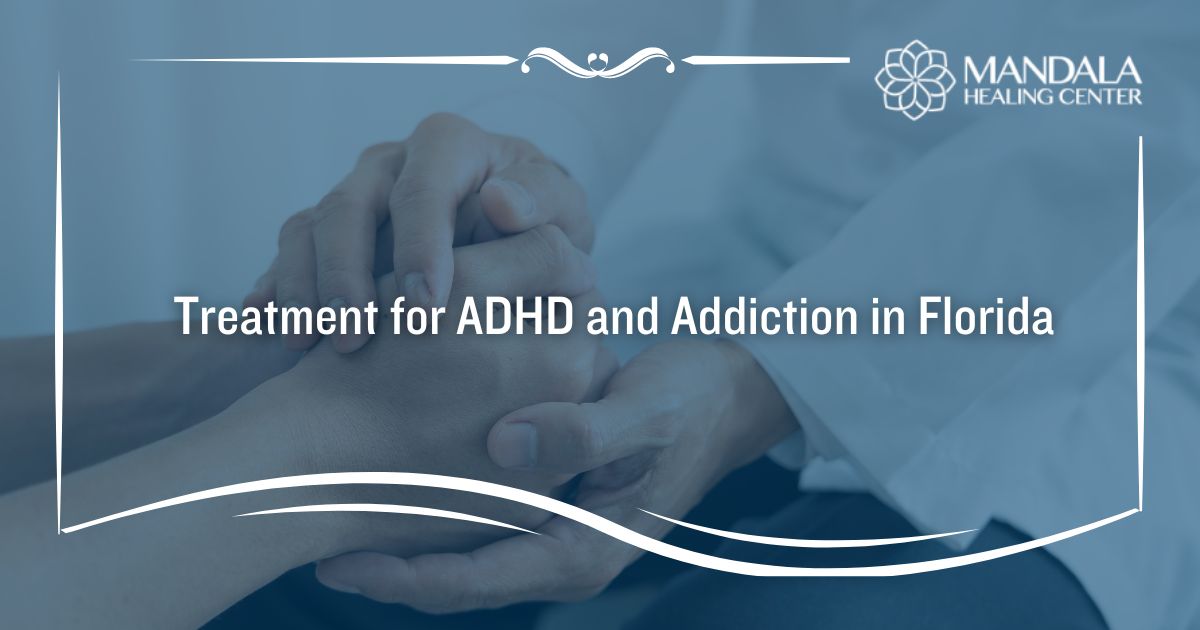Attention-deficit hyperactivity disorder (ADHD) is a mental health condition that causes an inability to focus, impulsive behavior, and hyperactivity. People with ADHD might not be able to sit still, blurt out their thoughts, and excessively fidget. This condition often begins in childhood and continues to affect people throughout adulthood.
Unfortunately, having ADHD increases your risk of developing a substance use disorder. About half of individuals with ADHD also suffer from addiction.[1]
When you have both ADHD and a substance use disorder, you must receive treatment for both conditions at once. While ADHD is traditionally treated with stimulant medications, there are non-stimulant options to prevent you from becoming addicted to your medicine. Treatment also involves a combination of medical detox, evidence-based therapies, and relapse prevention planning.
In this article, you will learn:
- What is the connection between ADHD and substance abuse
- How is ADHD and addiction treated in Florida
- Why each treatment service is important for the recovery from co-occurring ADHD and substance use disorder
How is ADHD Connected to Addiction?
Before you are diagnosed with ADHD, you might have a hard time coping with your symptoms. Without the proper coping mechanisms, you could be tempted to use unhealthy strategies to manage your symptoms. For example, you might find that drugs and alcohol mask symptoms like impulsivity, inattention, and hyperactivity.
Over time, your substance abuse will lead to the development of an addiction. Research shows that children with ADHD are two to three times more likely to abuse drugs and alcohol than kids without the condition.[2]
Because the risk of substance abuse is higher when you have ADHD, it’s important to seek effective treatment and avoid substance abuse as much as possible. If you have already developed a substance use disorder, you should seek help from a dual-diagnosis rehab program in Florida.
How Does ADHD and Addiction Treatment in Florida Work?
The link between ADHD and addiction is strong. If you are dealing with both conditions, you should seek treatment for them at the same time. Thankfully, dual diagnosis centers in Florida offer evidence-based recovery services for ADHD and substance abuse simultaneously.
During ADHD and addiction treatment in Florida, you can expect:
Assessment and Diagnosis
The first step in an ADHD and addiction treatment center is an in-depth assessment. Medical professionals will ask you questions about your history of substance abuse, medical information, and family history. You will also be assessed to ensure that ADHD is the co-occurring condition you are struggling with.
Once these assessments have been completed, your treatment program can draft an individualized treatment plan. It will include addiction treatment services like medical detox and behavioral therapies. Your treatment plan will also offer treatments for ADHD, including medication, therapy, and peer support.
Medical Detox
Before you can begin working on your ADHD, you have to overcome drug or alcohol withdrawal. The type of substance you are addicted to will influence what type of detox treatment you need. For example, alcohol withdrawal is often treated with benzodiazepines while opioid withdrawal is managed using methadone or Suboxone.
Medication Management
Once you have completed detox, you will be stabilized on medication for your ADHD. Typically, ADHD is treated using stimulant medications. Because stimulants are habit-forming and addictive, your psychiatrist will try non-stimulant options first.
Examples of non-addictive ADHD medications include:[3]
- Atomoxetine (Strattera)
- Viloxazine (Qelbree)
- Clonidine (Catapres, Kapvay)
- Guanfacine (Tenex, Intuniv)
Evidence-Based Therapies
Next, you will engage in therapy for both ADHD and your addiction. The most commonly used therapy for addiction is cognitive behavioral therapy (CBT). This therapeutic model focuses on changing negative patterns of thought and behavior and developing healthy coping mechanisms.
CBT also works well for ADHD. Studies show that CBT might improve the core symptoms of ADHD.[4] In combination with medication, managing the symptoms of your condition will be much easier.
Relapse Prevention and Aftercare
Once you participate in individual therapy and counseling, you will be nearing the end of your treatment. Before you leave, you will engage in relapse prevention planning for addiction. This process involves identifying triggers for relapse and learning coping strategies to avoid it.
In addition, aftercare is an important piece of relapse prevention. Your treatment center for ADHD and addiction in Florida might offer the following types of aftercare:
- Continued therapy
- Medication management
- Access to an alumni support group
- Referrals to outpatient rehab or sober living
- Recommendations on local support groups
- Case management services like vocational training
Get Connected to an ADHD and Addiction Rehab Center in Florida
If you or a loved one suffers from comorbid ADHD and substance abuse, it’s time to seek help. At the Mandala Healing Center, we offer a comprehensive program that will address ADHD and addiction at the same time. Additionally, we only use evidence-based and clinically proven services, ensuring you receive the best care possible.
Contact us today for more information on our treatment center for addiction and ADHD in Florida.
References:
- EurekAlert: Half of adults with ADHD have had a substance use disorder
- Science Direct: Prospective association of childhood attention-deficit/hyperactivity disorder (ADHD) and substance use and abuse/dependence: a meta-analytic review
- Taylor and Francis Online: Evidence-based prescribing of medications for ADHD: where are we in 2023?
- The National Library of Medicine (NLM): Cognitive‐behavioural interventions for attention deficit hyperactivity disorder (ADHD) in adults












